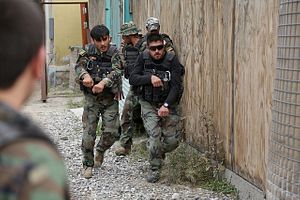Looking through the headlines emanating from Afghanistan it would be difficult to find any message of hope or progress. The situation looks bleak, with reports stipulating that the Taliban controls more territory than at any point since it lost power in 2001. Afghan forces saw record casualties, and a recent NATO report has concluded that a majority of Afghan infantry units are combat ineffective, with only 1 out of 101 units operationally ready and 38 suffering from major issues. But not all is lost in the war-torn country. For one thing, the 2015 fighting season has provided Afghan forces with much needed lessons learned from the battlefield, lessons that are not impossible for Afghan forces to implement
Much of Afghanistan’s record casualty numbers can be attributed to the withdrawal of U.S. and NATO forces from a combat role last year, and the ushering in of the “train, advise, and assist” mission, aka Resolute Support. During this pivotal 2015 fighting season Afghan forces took the lead role in providing security for its country. Though Afghan forces have struggled to combat a reinvigorated Taliban, they still control all key urban population centers, including wrestling back control of Kunduz last October.
Headline grabbing advances by Taliban forces have usually been overturned by security forces, as Afghan forces have been able to regain much of the territory lost to the Taliban either immediately or within a few days, and although coalition partners have assisted, that assistance has been minimal. To put this in perspective, NATO airstrikes to assist Afghan forces in retaining the vitally important Sangin province or retaking Kunduz city could be counted on one hand, while coalition airstrikes to retake Ramadi in Iraq numbered over 600.
Despite all the fuss, Afghan forces have performed well, and come the 2016 fighting season, they will be equipped with a more robust air capability to include brand new Mi-25 attack helicopters from India, and a dedicated fixed wing close air support platform, the A-29 Super Turcano.
Afghanistan has struggled to develop an efficient air force capable of providing close air support to combat units on the ground and conducting casualty evacuations. The arrival of the A-29 Super Turcano will fill a much needed gap in the country’s close air support needs, with the added benefit that it can be outfitted with GPS guided precision strike capabilities to target insurgent leaders.
However, military hardware is not the only solution to Afghan Army woes; many of the failures of the 2015 fighting season can be attributed to mismanagement by the National Unity Government and an Afghan Ministry of Defense struggling to fill the void of thousands of foreign troops.
At the height of the Afghan conflict, NATO and U.S. forces operated out of nearly 825 military outposts, now there are roughly 20. Afghanistan’s reaction to this has been to man numerous checkpoints and outposts, making them incapable of conducting offensive operations or maneuver warfare. Roughly 30 percent of the Afghan Army and half of the Afghan National Police have been distributed amongst various outposts and checkpoints, limiting their ability to operate in cohesive units. This also makes them sitting ducks for coordinated attacks by the Taliban, allowing the enemy to dictate the terms of the battlefield.
The fighting in 2015 served as a test for Afghan forces, one they largely passed; however, without adapting to lessons learned, 2016 could see further gains by insurgent forces, and possibly the total collapse of an Afghan province, Helmand. Afghan forces will need to prioritize territory, abandon checkpoints, re-organize, and successfully incorporate new technologies if they wants to maintain the status quo.
Shawn Snow is a veteran of the U.S. Marine Corps and graduate of the Fletcher School of Law and Diplomacy specializing in Central and Southwest Asia. He served 10 years as a Signals Intelligence Analyst and completed multiple tours of duty to Iraq and Afghanistan. He has been published in Foreign Policy, The Diplomat, Washington Post and Small Wars Journal.

































